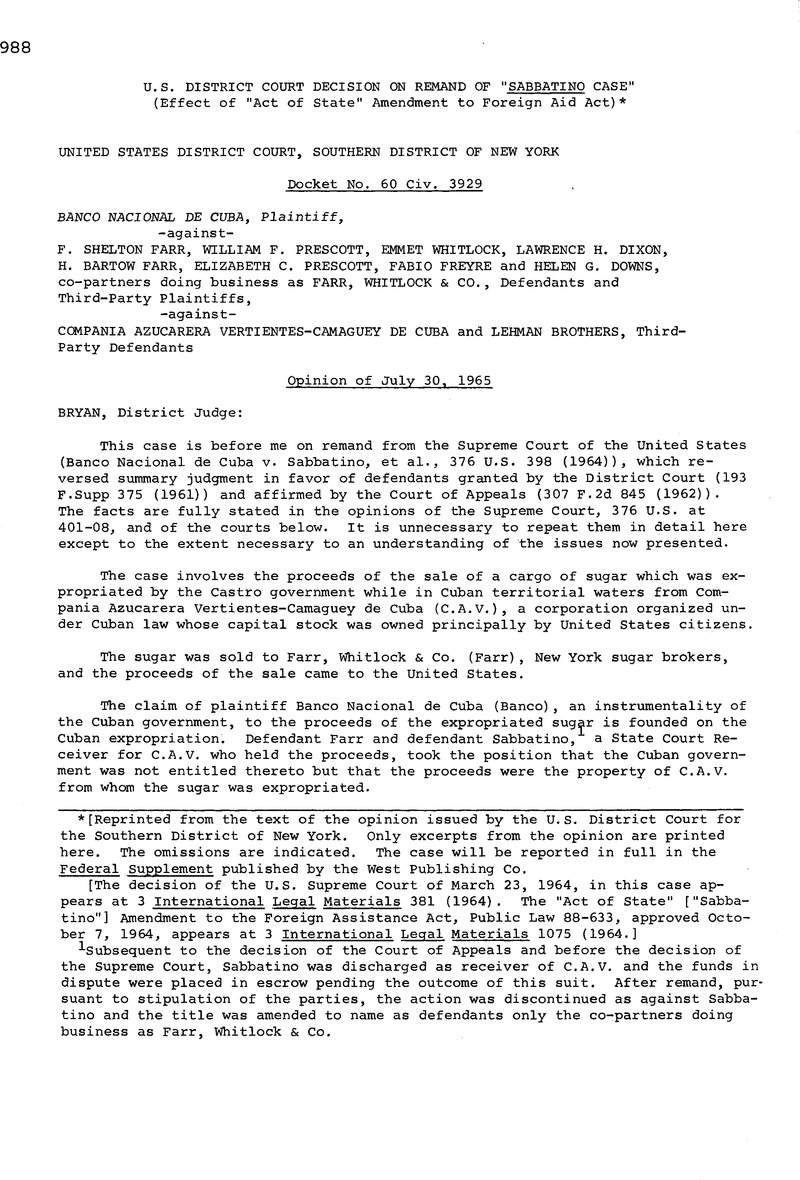No CrossRef data available.
Published online by Cambridge University Press: 04 April 2017

[Reprinted from the text of the opinion issued by the U.S. District Court for the Southern District of New York. Only excerpts from the opinion are printed here. The omissions are indicated. The case will be reported in full in the Federal Supplement published by the West Publishing Co.
[The decision of the U.S. Supreme Court of March 23, 1964, in this case appears at 3 International Legal Materials 381 (1964). The “Act of State” [”Sabbatino”] Amendment to the Foreign Assistance Act, Public Law 88-633, approved October 7, 1964, appears at 3 International Legal Materials 1075 (1964.]
1 Subsequent to the decision of the Court of Appeals and before the decision of the Supreme Court, Sabbatino was discharged as receiver of C.A.V. and the funds in dispute were placed in escrow pending the outcome of this suit. After remand, pursuant to stipulation of the parties, the action was discontinued as against Sabbatino and the title was amended to name as defendants only the co-partners doing business as Farr, Whitlock & Co.
5 The Government suggests that the Amendment could be construed to apply only to transactions after its passage involving property confiscated any time after January 1, 1959. If the basic principle in the law merchant of shelter, see Uniform Commercial Code sees. 2-403(1), 3-201 & comment 3. is not to be abandoned, virtually the only past seizures to which the Amendment would apply would be those in which the confiscating government disposed of the property after October 7, 1964. The Cuban confiscations would be read out of the Amendment almost entirely, and there would be little if any opportunity for it to operate before January 1, 1966.
6 Chief Justice Marshall also indicated that “in great national concerns” statutes are more likely to be construed retroactively than “in mere private cases between individuals.” This is such a case.
7 The parties first agreed that the Hickenlooper Amendment was passed too late for the Supreme Court to amend its mandate. The third party defendants now indicate that may not be so. I will not attempt to determine the powers of the Supreme Court under its own rules, and there is no need to do so here.
9 It may be noted, also, that the Supreme Court expressly declined to pass on the so-called Bernstein exception to the act of state doctrine predicated upon a letter from the Acting Legal Adviser to the State Department written for the purpose of relieving the court from any constraint upon the exercise of its jurisdiction to pass on the validity of the foreign decree involved in that case. 376 U.S. at 420; see Bernstein v. Van Heyghen Frères Société Anonyme, 163 F.2d 246 (2 Cir.), cert. den., 332 U.S. 772 (1947); Bernstein v. N.V. Nederlandsche-Amerikaansche Stoomvaart-Maatschapplij, 173 F.2d 71 (2 Cir. 1949), 210 F.2d 375 (2 Cir. 1954) (per curiam).